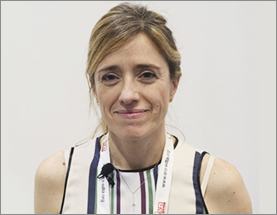
Nephrologist Maria Jose Soler Addresses Role of ACE2 in Preventing Lesions in Diabetic Kidney Disease
 2020-08-21
2020-08-21
Spanish nephrologist Mari Jose Soler studies diabetic kidney disease and diabetic neuropathy of the kidney, which is the primary cause of renal disease.
She explains
- How the angiotensin converting enzyme (ACE) and ACE2 work in the kidney,
- What sort of balance between ACE, ACE2, and vitamin D results in disease prevention, and
- What are additional therapies she's working on to prevent disease of kidney progression, which leads to dialysis treatment.
Maria Jose Soler is in the nephrology department at the Vall d’Hebron Hospital Universitario at the Barcelona campus and is also in the Nephrology Research Group. She gives listeners some background on the discovery of the ACE2 enzyme in 2000 and explains how it functions in cells, especially in kidney cells.
A form of ACE2 is in the news lately because it is the receptor of the coronavirus. In other words, it provides the mechanism that allows the virus to attach to and enter the cell. ACE2 catalyzes peptides in cells throughout the body and is especially prevalent in kidney cells.
She then explains the various stages of diabetic kidney disease, from the glomerular filtration being affected to lesions, hyper filtration, risk of stroke, and eventually dialysis treatment. She explains her study on diabetic mice that established ACE2's role in preventing lesions in the early stage of kidney disease. But she also explains nuances between the role of ACE and ACE2, and how too much ACE can be a problem.
Finally, because the body's mechanisms for ACE2 amplification do not last long, she establishes the need for further therapies to prevent progression of these diseases of the kidney.
For more, search her name in Google Scholar for publications.
Available on Apple Podcasts: apple.co/2Os0myK
More Episodes
Create your
podcast in
minutes
- Full-featured podcast site
- Unlimited storage and bandwidth
- Comprehensive podcast stats
- Distribute to Apple Podcasts, Spotify, and more
- Make money with your podcast
It is Free
- Privacy Policy
- Cookie Policy
- Terms of Use
- Consent Preferences
- Copyright © 2015-2024 Podbean.com






